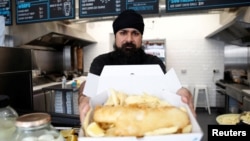Fish and chips have been popular among Britons since the food was invented some 160 years ago.
Charles Dickens wrote about the dish in his well-known story of Oliver Twist. Unlike other common food, it was not rationed during the world wars.
But a third of fish and chip shops are at risk of going out of business this year due to price pressures, says Company Debt, a business advisory company.
Price increases and inflation
In just a year, the prices for fish, like cod and haddock, are up 75 percent. Sunflower oil used for cooking is up 60 percent and even flour is up 40 percent.
Overall, inflation in Britain reached a 40-year high of 9 percent in April, the highest among G7 countries. And it is expected to rise even higher.
At west London's Hooked Fish and Chips, Bally Singh is struggling to keep up sales for the traditional British dish. Fish and chips in Singh's shop now cost almost 10 pounds, compared to around 8 pounds a year ago. And Singh said if he passed on all the higher costs, the price would be closer to 11 pounds.
"We're finding it a struggle to keep our prices reasonable and competitive compared to other fast foods that are in the area, and we've actually seen a decline in fish sales and customers walking through the door," he said.
All the difficulties
Some of the recent difficulties for fish and chip shops started with Britain’s withdrawal from the European Union (EU). UK Fisheries, a fishing company, said in 2022, Britain had to reduce its Arctic cod catch to around 40 percent of what it was before leaving the EU.
Russia's invasion of Ukraine has driven up fuel and electricity prices, further increasing the cost of catching, and frying, fish. The war has sent cooking oil, fertilizer and flour prices higher, too.
Cod and haddock are sourced in the Barents Sea, north of Norway and Russia. The war has increased uncertainty over those supplies.
In March, the British government listed Russian white fish as among goods to be hit with a 35 percent tax in response to the invasion of Ukraine. It has paused the move, for now, while the effects are investigated.
Sunflower oil is the main agricultural product that Britain imports from Ukraine. The government says it is working to replace it with other vegetable oils such as rapeseed.
A spokesperson for Department for Environment, Food & Rural Affairs said it was "working closely with industry, including the National Federation of Fish Friers (NFFF), to mitigate the challenges that they are facing." Mitigate means to make something less harmful or severe.
However, the federation said fish and chip shops are facing their biggest crisis ever. "I'm getting daily phone calls from people that are worried that they're going to go out of business," NFFF President Andrew Crook told Reuters.
Malcolm Petherick is 73 years old. He worried changes he has seen over his lifetime might result in Britain losing a part of its cultural history.
"When I was growing up, it was a poor man's meal," he said about fish and chips. He added that he just bought two orders of fish and chips for 23 pounds.
"What family can afford that?” he asked.
I’m John Russell.
Alistair Smout reported on this story for Reuters. John Russell adapted it for VOA Learning English.
________________________________________________________________________
Words in This Story
dish – n. food that is prepared in a particular way
ration – v. to control the amount of (something, such as gasoline or food) that people are allowed to have especially when there is not enough of it
customer –n. someone who buys goods or services from a business
fertilizer -- n. a substance (such as manure or a special chemical) that is added to soil to help the growth of plants
response – n. something that is done as a reaction to something else
afford – v. to be able to pay for (something)





